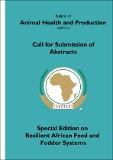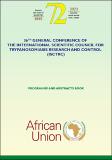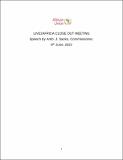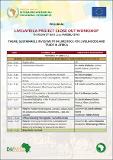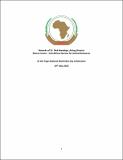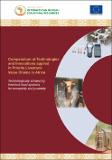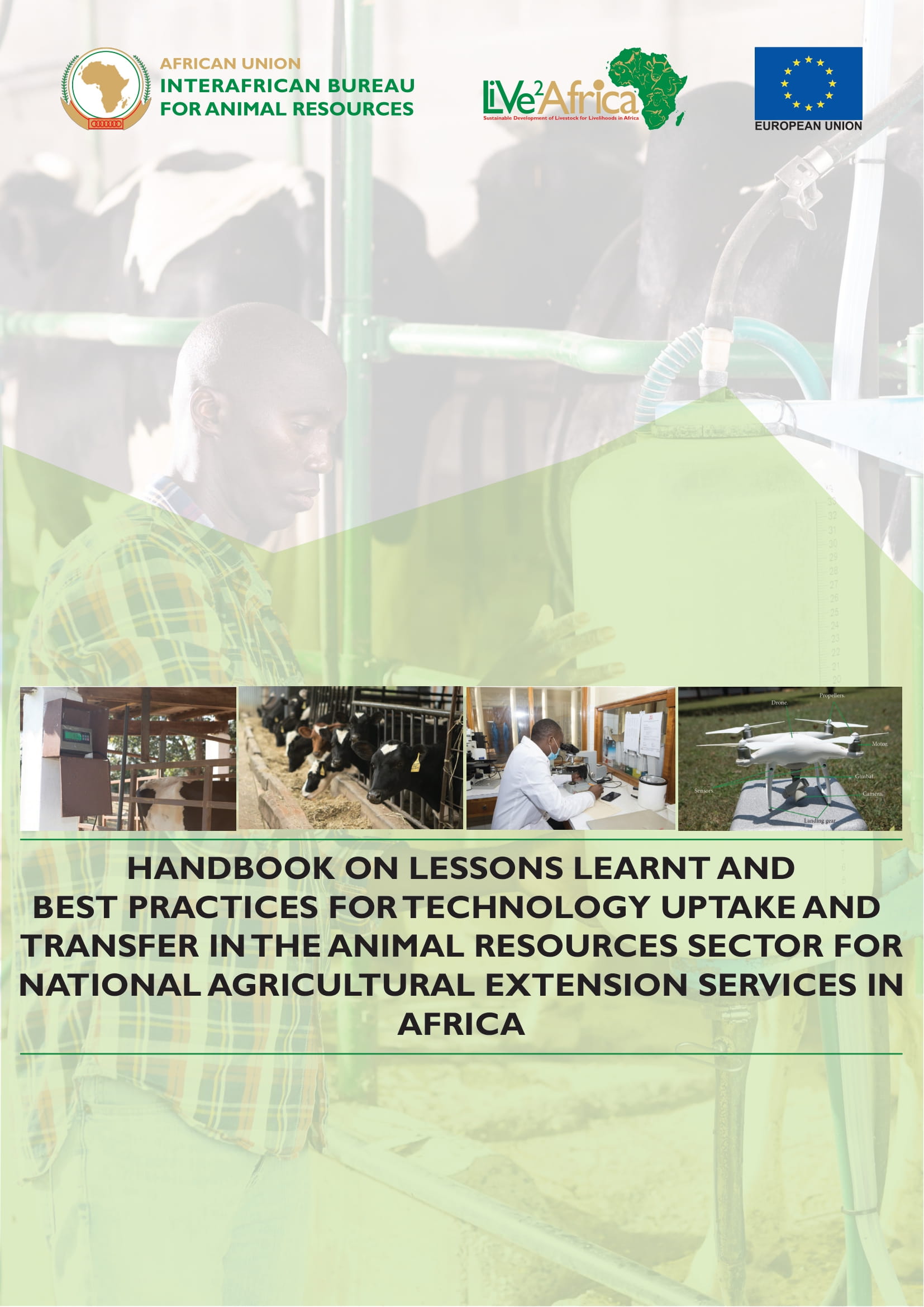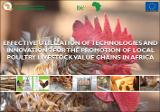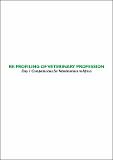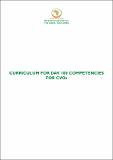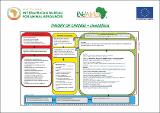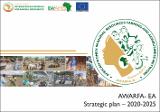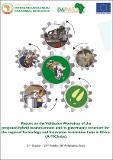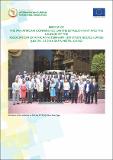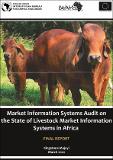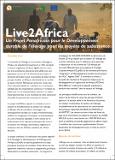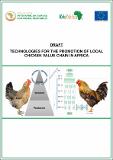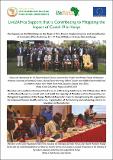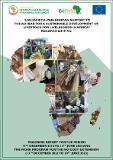AU-IBAR Initiatives and Project Reports
Browse by
The African Union Inter-African Bureau for Animal Resources (AU-IBAR) is a specialized technical office of the African Union. It was established in 1951 and was initially known as the Inter-African Bureau of Epizootic Diseases. Initially it was mainly concerned with rinderpest control, but its mandate was expanded to other major animal diseases in 1956 and finally to all aspects of animal resource development in 1970.
The 2005-2007 AU/IBAR programme is focused on Animal Health and production as well as trade and markets. In this context trypanosomiasis which is considered a major obstacle to African agricultural development is of particular concern to AU/IBAR.
Sub-communities within this community
-
Z_Temporary Holding [24]
Collections in this community
-
VetGov Project [1]
VetGov Project
Recent Submissions
-
A-TCUBS Newsletter
(2020) -
Call for Abstracts: Special Issue on Resilient African Feed and Fodder Systems of the Bulletin of Animal Health and Production in Africa (BAHPA)
(2024)The RAFFS Project aspires to make substantial contributions to food security and nutrition by ensuring the continued sustainability of Africa's livestock sector through promoting development of feed and fodder systems. ... -
36th ISCTRC Programme and Book of Abstracts.
(2023)36th International Scientific Council For Trypanosomiasis Research and Control (ISCTRC) Programme and Book of Abstracts. -
Live2Africa Close Out Meeting: Speech by Amb. J. Sacko, Commissioner, AUC
(2023-06-08)Speech by Amb. J. Sacko, Commissioner, AUC, given during the Live2Africa Close Out Meeting on 8 June, 2023 -
Live2Africa Project Close Out Workshop: Programme
(2023-06-08)Live2Africa Project Close Out Workshop Programme held under the theme "Sustainable Investment in Livestock for Livelihoods and Trade in Africa" -
Togo National World Bee Day Celebration: Remarks of Dr. Nick Nwankpa, Acting Director African Union – InterAfrican Bureau for Animal Resources
(2023-05-20)Remarks of Dr. Nick Nwankpa, Acting Director, African Union – InterAfrican Bureau for Animal Resources the Togo National World Bee Day Celebration 2023. -
Compendium of Technologies and Innovations applied in Priority Livestock Value Chains in Africa
(2022-12-01)The Compendium of Technologies and Innovations applied in Priority Livestock Value Chains in Africa, the African Union project on Sustainable Development of Livestock for Livelihoods in Africa (Live2Africa) has documented ... -
A handbook on lessons learnt and best practices for technology uptake and transfer in the animal resources sector for national agricultural extension services in Africa
(2021)This handbook is a collection of expert perspectives on identified gaps and recommendations needed to ensure that national agricultural extension services in Africa are fully equipped and guided to improve technology ... -
Effective utilization of technologies and innovations for the promotion of local poultry livestock value chains in Africa
(2021)The training manual aims to enhance the capacity of smallholder poultry producers to adopt and use modern technologies and innovations developed for the poultry sector. The training manual contains the information required ... -
Re-profiling of Veterinary Profession: Day 1 Competencies for Veterinarians in Africa
(2019)This publication serves as a resource for member countries. The guide is intended to be used to tailor their skills to their individual needs, and in accordance to the OIE's Recommendations on the Competencies of Graduating ... -
Curriculum for Day 100 Competencies for CVOs
(2022)The Day 100 Competencies Curriculum is an eight-module training package for newly appointed CVOs. The curriculum puts into action the Animal Health Strategy for Africa (AHSA) 2020-2035, developed by AU-IBAR in close ... -
Theory of Change – Live2Africa
(2022)This theory of change provides a description of the pathways for change for the Live2Africa Project. -
African Women in Animal Resources Farming & Agribusiness Network (AWARFA-N)
(2022)This strategic plan articulates AWARFA's goals and strategies in accordance with the African Livestock Development Strategy (LiDeSA). It was created through consultations with the technical team of the African Women in ... -
Live2Africa: Report of a validation workshop on proposed hybrid business model, and governance structure for the regional Technology and Innovation Incubation hubs in Africa (A-TiChubs)
(2019-10)This report is the outcome of a validation exercise for hybrid continental draft business models for the establishment and operation of regional Technology and Innovation Incubation hubs in Africa (A-TiChubs). The draft ... -
Report of the Pan African Conference on the Establishment and the Launch of the Association of African Veterinary Statutory Bodies (2AVSB)
(2018-07)This report is the result of a Pan African Conference, which established and launched an autonomous Association of African Veterinary Statutory Bodies (2AVSB) for veterinarians and veterinary paraprofessionals. -
Market Information Systems Audit on the State of Livestock Market Information Systems in Africa
(2022-03)Majority of African livestock farmers are older smallholders living in isolated rural areas and thus lack appropriate access to markets for their products and they are also deprived of agricultural market information. ... -
Brochure du projet Live2Africa
(2021)Cette brochure du projet Live2Africa fournit un contexte au projet et au contexte dans lequel le projet est situé, met en évidence les sept domaines de résultats des projets qui sont alignés sur plusieurs programmes, ... -
Technologies for the Promotion of Local Chicken Value Chain in Africa
(2022)This manual aims to provide small-holder chicken farmers with the knowledge, skills, and tools they need to become more efficient and productive farmers for the promotion of the chicken local value chain in Africa. -
Live2Africa support on mitigating the Impact of Covid-19 in Kenya
(2018)This brief highlights interventions that were supported through Live2Africa Project, that proved useful towards mitigating the Impact of Covid-19 in Kenya. -
Progress Report for the Period 13th December, 2016 to 12th June 2023 and the work Program for the No - Cost Extension
(2021)Livestock is a largely untapped sector, where appropriate investment could deliver substantive results for realizing the desired accelerated transformation of the Agricultural Sector

